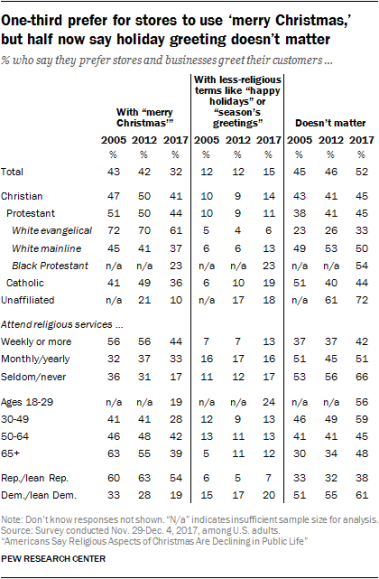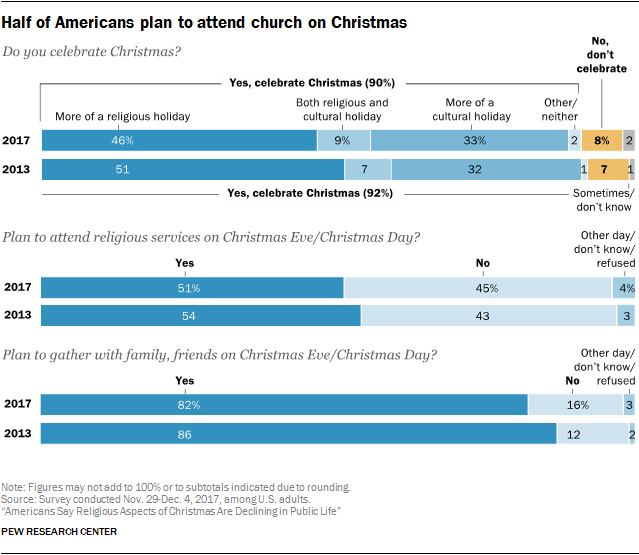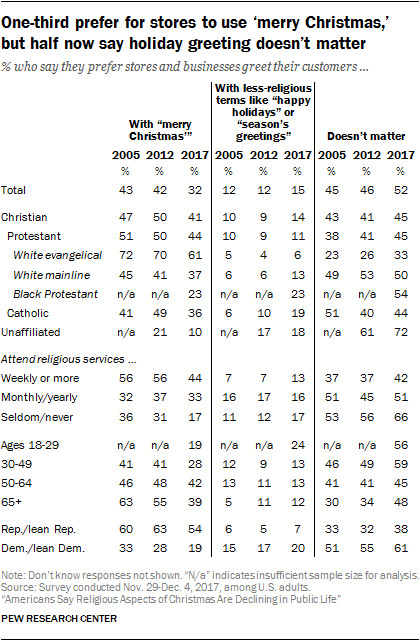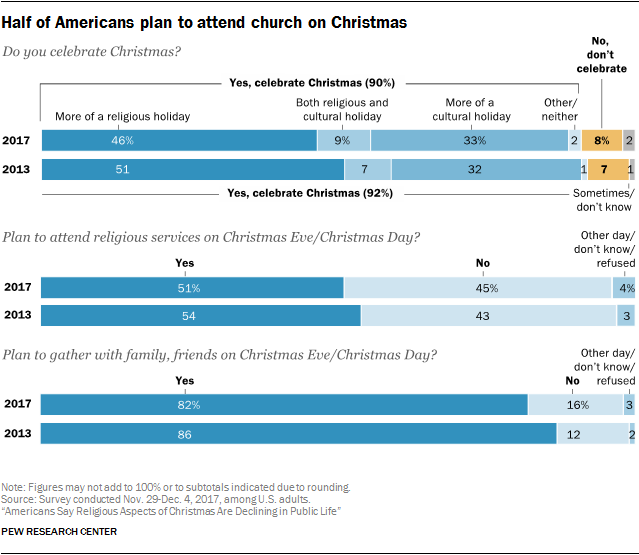It’s no secret that President Donald Trump feels strongly about wishing people a Merry Christmas.
“I’m a good Christian. If I become president, we’re gonna be saying ‘Merry Christmas’ at every store,” he told Iowa voters back in 2015. “You can leave ‘Happy Holidays’ at the corner.”
Two weeks ago, he lit the White House Christmas tree with his wife Melania, then tweeted: “As the president of the United States, it’s my tremendous honor to finally wish America and the world a very merry Christmas.”
But fewer Americans feel as strongly about the greeting, according to a new survey released today by the Pew Research Center. Those who say it doesn’t matter what companies or organizations call the holiday season rose to 52 percent in 2017, up from 45 percent in 2005. At the same time, those who prefer “Merry Christmas” dropped to 32 percent in 2017, down from 43 percent in 2005.
The trend holds true among self-identified white evangelicals. Those who prefer “Merry Christmas” dropped to 61 percent in 2017 (down from 70 percent in 2012), while those who say it doesn’t matter rose to 33 percent in 2017 (up from 26 percent in 2012).

Pew didn’t break out black Protestants—two-thirds of whom identify as evangelical—in its earlier surveys, but in 2017 more than half said the holiday greeting didn’t matter (54%), while the remainder were split between “Merry Christmas” (23%) and something less religious such as “Season’s Greetings” (23%).
Predictably, those who attend church weekly would rather hear “Merry Christmas.” But even they are more ambivalent than they used to be. The 56 percent who preferred a religious greeting in 2012 dropped to 44 percent in 2017, while desire rose for both a nonreligious greeting (7% to 13%) or for either greeting (37% to 42%).
A recent Morning Consult survey asked the question a little differently, querying whether it was appropriate or inappropriate for store employees to wish customers a “Merry Christmas.”
Three-quarters of adults (76%) said the greeting was fine, compared to 7 percent who said it was inappropriate and 17 percent who didn’t know. Among self-identified evangelicals, 85 percent said “Merry Christmas” was fine, while 5 percent said it was inappropriate and 9 percent said they didn’t know.
Most American adults (71%) and evangelicals (67%) also said “Happy Holidays” was a good greeting, though more evangelicals (20%) than Americans (13%) said it would be inappropriate.
More than half of evangelicals said if a store uses “Merry Christmas,” they’d be more likely to shop there (65%), while 3 percent said they would be less likely to shop there and 27 percent said it made no difference. The use of “Happy Holidays” would attract 34 percent of evangelicals, push away 22 percent, and make no difference for 36 percent, according to Morning Consult.
Fewer Americans than evangelicals said the use of “Merry Christmas” would make them more likely to use a company’s services (47%), but it wouldn’t make them stay away (4%), and 42 percent said it wouldn’t make a difference. If a store used “Happy Holidays,” 29 percent said they’d be more likely to shop there, 14 percent said they’d be less likely to shop there, and 48 percent said it wouldn’t make a difference.
Even though white evangelicals are more likely to shrug over holiday greetings, slightly more of them see Christmas as a religious holiday, Pew found. In 2013, 82 percent said Christmas was “more religious than cultural;” this year, 84 percent said the same. At the same time, those who saw Christmas as “more cultural than religious” dropped from 9 percent to 5 percent.
They’re the only group to move this direction; all others are slightly less likely to consider Christmas more religious than cultural. Black Protestants dropped from 60 percent to 55 percent; weekly church attendees dropped from 76 percent to 69 percent; and Americans overall dropped from 51 percent to 46 percent.
More white evangelicals also said they would include church in their festivities, perhaps because Christmas Eve lands on a Sunday this year. More than three-quarters said they would attend religious services in 2017, up from 71 percent in 2013 when Christmas was on a Wednesday.

White mainline Christians are also far more likely to attend church this year (57%, up from 47% in 2013). In contrast, both black Protestants (59%, down from 65%) and Catholics (68%, down from 76%) are less likely to attend. Weekly church attendees are just as likely to go this year (84%) as they were four years ago (83%).
While Americans in general are less likely to believe the history of the Nativity, almost all evangelicals still do. Nearly all said Jesus was born to a virgin (95%), that an angel announced Jesus’s birth to the shepherds (97%), that wise men brought gifts (95%), and that Jesus was laid in a manger (98%).
About 9 in 10 black Protestants were also convinced: 96 percent said Jesus was born to a virgin, 91 percent said an angel made the birth announcement, 90 percent said wise men came with gifts, and 88 percent said Jesus was laid in a manger.
Overall, more than two-thirds of Americans know Jesus was born to a virgin (66%), that an angel announced Jesus’ birth (67%), that wise men brought gifts (68%), and that Jesus was laid in a manger (75%).
However, the share of American adults who believe in all four elements of the biblical Christmas story has declined, from 65 percent in 2014 to 57 percent in 2017. The share who don’t believe in any of the four elements has risen, from 14 percent in 2014 to 19 percent in 2017.
While white evangelicals are just as likely to see and celebrate Christmas religiously, their stance on Christmas in the public sphere has softened. Along with lessening zeal for “Merry Christmas,” fewer white evangelicals said it was okay to display Christian symbols like nativity scenes on government property (80%, down from 90% in 2014).
While the same number said government-displayed nativities were okay if they were accompanied by other religious symbols such as Hanukkah candles (24% in 2017, vs. 23% in 2014), fewer thought the nativity alone would be appropriate (57% in 2017, vs. 67% in 2014), and more said government property should be free of religious Christmas displays altogether (13% in 2017, vs. 5% in 2014).
Fewer black Protestants than white evangelicals said displaying Christian symbols on government property was okay (71% in 2017). Two out of five black Protestants said it was okay to have a nativity without symbols from other religions (41%), while about one-third said other religions needed to be represented (31%), and 16 percent said government property should be religion-free.
That might explain why white evangelicals believe the religious aspects of Christmas are less emphasized in American society now than in the past (71%), more so than black Protestants (52%) or weekly worshipers (63%). That change also bothers white evangelicals (59%) more than black Protestants (31%) or weekly worshipers (44%).
A November YouGov poll found that the British also prefer to call the holidays “Christmas,” (83%), though a separate study revealed 1 in 5 didn’t know the celebration is for Jesus’ birthday. (They thought he was born on Easter.) Only about 30 percent said they learned about Jesus from reading the Bible.
Aware that fewer British children know the Christmas story, one Christian charity is trying to make their annual storytelling less confusing by cutting out the references to the Bible.
In previous versions of the Christmas story, which it sends to 100,000 children each year, Scripture Union included Bible verse references and encouragement for children to compare the story among the gospels.
But this year it took “that barrier away,” church and community fundraising manager Jennifer Babb told The Telegraph. “When we realized that children don’t even know the basics of what they are celebrating, then the traditional, simple story is the best way.”
Still, most British evangelicals said that Christmas is a celebration of Jesus’ birth and a great time to tell people about him (66%), according to a 2016 poll by the UK Evangelical Alliance. Nearly all said they would attend take part in a religious activity like singing carols or attending church (99%), while 89 percent said they planned tovolunteer or give money to a charitable cause.











